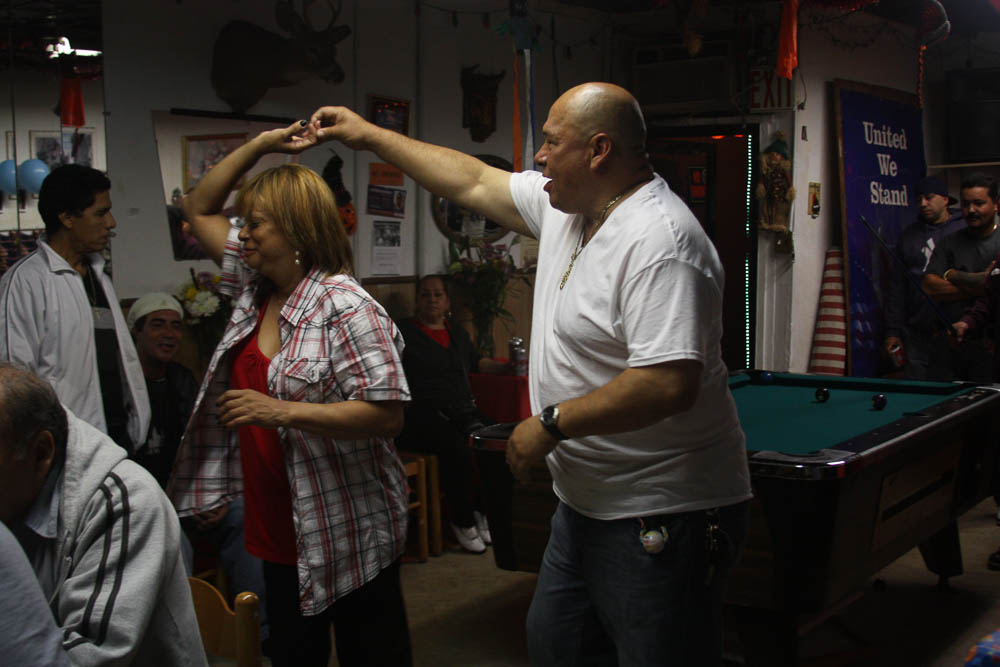
Just a few blocks southeast of Bedford Avenue’s vintage record stores and vegan restaurants, a visitor to Williamsburg might catch a few stray notes of salsa music spilling out onto Grand Street. There, a little entrance marked only by Christmas lights leads back to a different era.
Opened in 1973, Toñita’s is one of the very last Puerto Rican bars remaining in Los Sures, a historically Hispanic section of Williamsburg’s South Side. Baseball trophies, Christmas tinsel, a deer head and a disco ball decorate the space. But the real atmosphere is created by the regulars, who range in age from six years old to well into their seventies. They’re bound together by food, music—and most importantly—a palpable sense of community, in a neighborhood that’s lost more than 10,000 Latino residents to gentrification over the last decade.
Owner Maria Antonia “Toñita” Cay was 15 years old when she came to Manhattan from Puerto Rico. Taking a job at a skirt factory, she worked her way up from sewing buttonholes to becoming a manager by age 19. She helped bring her father and each of her siblings to be with her after her mother passed away in Puerto Rico, eventually reuniting the entire family in New York City.
Cay first opened Caribbean Sports Bar—the club that affectionately became known simply as “Toñita’s”—across the street from an apartment she was renting on Grand and Roebling in Williamsburg. By 1976, Cay had saved up $12,000—enough to buy both the apartment unit and the small commercial space beneath it that would become the club’s home in 1999, when it moved across the street, Christmas lights, tinsel and all.

It wouldn’t be Saturday night at Toñita’s without some dance moves. Photo: Kristen Clark
In the decades that followed, as Los Sures’ other Puerto Rican bars folded one by one under the weight of soaring rents, Toñita‘s remained unchanged—a gathering place for neighborhood baseball clubs and dominos tournaments.
For bar regular Mayra Varela, Toñita’s represents a homecoming. Varela spent her childhood encircled by the South Side’s tightly-knit Puerto Rican community, but left Williamsburg when she was 17. When she returned after her father’s death three decades later, it was to a neighborhood that had been utterly transformed by waves of artists, students, and upwardly mobile Manhattanites.
Varela wandered into Toñita’s on her first weekend back in her old neighborhood, in search of memories and old family friends. Inside she found scores of the men and women who had known her in diapers—among them her father’s entire baseball team.
“I came back to my stomping grounds,” she said. “This is what was missing in my life.”

The pool table is almost as busy as the dance floor. Photo: Kristen Clark
The club now opens its arms to old-timers and newcomers alike. Every Sunday, Cay serves trays of beans, rice and chicken to the neighborhood’s homeless residents or anyone else looking for a hot meal.
On a recent Sunday, Jaime Falquez, another regular, waited outside on Grand Street to help set up for the meal.
“I never saw that before,” he remarked as a pair of of joggers in Lululemon attire sprinted past. “Running, bicycles—it’s just like Manhattan.”
While troubled by the displacement of the Latino community, many among the Toñita‘s crowd say they’re happy to see a neighborhood once riddled by drugs and violence getting a new lease on life.
“There are more businesses, different types of people, all kinds of cultures down here. This neighborhood improved a lot from what it used to be,” said Falquez. “I love it here. And I want to be a part of this until I die.”
Maria Toñita Cay now runs the bar for the sheer joy of it, which she can afford to do since she owns the building, and can operate without the risk of a rent hike hanging over her head. Four days a week she sits in the back, her face hidden in the shadows as she watches old friends dance, play dominos, and drink $2 cans of Coors Light. When asked how she feels about the closing of other Puerto Rican clubs and the changing face of her neighborhood, she answers with a shrug and a smile.
“Now there are other kinds of bars.”


4 Responses